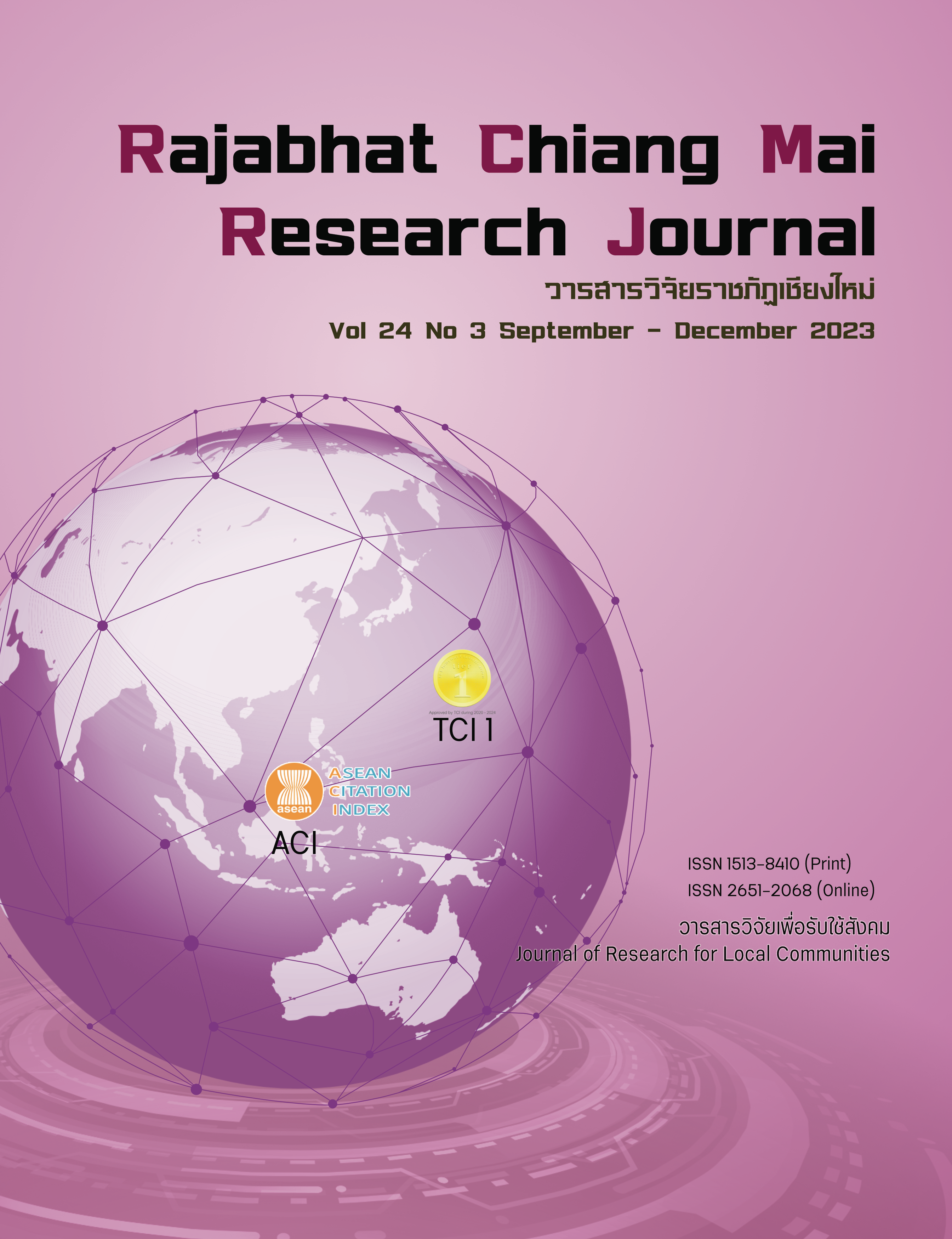Developing Professional Ethics for Teachers by Using Community Processes of Professional Learning Through Information Technology Systems for Students Practicing Professional Teaching Experience in Bachelor of Education Program in Early Childhood Education at Chiang Mai Rajabhat University, the Office of the Private Education Commission
DOI:
https://doi.org/10.57260/rcmrj.2023.266145Keywords:
Teacher professional code of ethics, Professional learning community, Information technology systems, Pre-service teachers, Early childhood educationAbstract
The objectives of this research were: 1) to investigate the current conditions and problems related to a teacher’s professional code of ethics of teachers; 2) to analyze factors supporting the success in developing a teacher’s professional code of ethics; 3) to develop professional learning community processes in developing teacher’s professional code of ethics through information technology systems for pre-service teachers; and 4) to propose guidelines for developing a teacher professional code of ethics by using professional learning community processes through information technology systems for pre-service teachers in the early childhood education program at Chiang Mai Rajabhat University, the Office of the Private Education Commission. The instruments used in this research were an in-depth interview form, a meeting record form, and an evaluation form. Data were analyzed by content analysis, classifying them into issues, mean and standard deviation, and summarizing into categories. Results of the research found as follows: 1) Results of investigating the current conditions and problems related to a teacher’s professional code of ethics consisted of five aspects. 2) Results of analyzing factors supporting the success in developing teacher professional ethics consisted of six aspects. 3) Results of developing professional learning community processes in developing teacher professional code of ethics through information technology systems of pre-service teachers in the early childhood education program at Chiang Mai Rajabhat University, the Office of the Private Education Commission consisted of nine components. The benefit and feasibility were at the highest level. 4) Results of proposing the guidelines for developing the professional code of ethics by using professional learning community through information technology systems of pre-service teachers in the early childhood education program at Chiang Mai Rajabhat University, the Office of the Private Education Commission consisted of nine items.
Downloads
References
Early Childhood Education Teachers Union in Finland. (2020). The Early Childhood Education Teacher’s Professional Ethics Guidelines. Retrieved from https://www.vol.fi/uploads/2020/10/f1d0a62f-the-early-childhood-education-teachers-professional-ethics-guidelines.pdf (In Thai)
Kaeowiset, T. (2023). The Integration of Community-Based Technology Transfer using the KWL Plus Technique for the Acceleration of Sustainable Community Enterprises in Phetchabun Province. Rajabhat Chiang Mai Research Journal, 24(1), 198–212. https://doi.org/10.57260/rcmrj.2023.263168 (In Thai)
Metapanya, B. (2019). The Professional Learning Community Model for Developing Learning Management to Promote the Analytical Thinking Ability of Students at Wat Chiang Yuen Municipal School. Rajabhat Chiang Mai Research Journal, 20(2), 69–82. https://doi.org/10.14456/rcmrj.2019.193180 (In Thai)
Office of Private Education Commission. (2023). Autonomy and Accountability. Retrieved from https://sites.google.com/a/opec.go.th/eng/ (In Thai)
Reungsri, S., Sukprasert, N., Phanphet, S., Boonyaprapa, P., & Dhedchawanagon, K. (2019). Pre-Service Teachers and Educational Management in Multicultural Schools. Rajabhat Chiang Mai Research Journal, 20(1), 71–80. https://doi.org/10.14456/rcmrj.2019.158578 (In Thai)
Royal Government Gazette. (2013). Regulation of the Teacher Council of Thailand on the Professional Code of Ethics 2013. Retrieved from https://www.ksp.or.th/ksp2018/wp-content/uploads/2020/06.pdf (In Thai)
Sanguanngarm, N. (2020). Factors Affecting the Failure of Thai Education to Equip Thai Students with 21st-Century Skills. Rajabhat Chiang Mai Research Journal, 21(2), 1–19. https://doi.org/10.14456/rcmrj.2020.225593 (In Thai)
Satjapiboon, S. (2019). The Evaluation of Professional Learning Community in Teacher Professional Ethics Developing Through the Information Technology Systems (e-plc). Journal of Educational Research, Faculty of Education Srinakharinwirot University, 14(2), 118-137. https://ejournals.swu.ac.th/index.php/jre/article/view/12295/10231 (In Thai)
Serviss, J. (2022). 4 Benefits of an Active Professional Learning Community. Retrieved from https://www.iste.org/explore/professional-development/4-benefits-action-professional-learning-community
Sithsungnoen, C., Po Ngern, W., & Vanichvattanavorachai, S. (2020). Strengthening of Ethic Professional Learning Community: e-PLC in Pre-service Teacher. ASEAN Journal of Education, 6(2), 15-24. https://aje.dusit.ac.th/upload/file/Flie_journal_pdf_29-10-2021_111043.pdf
The Office of the Education Council (2017) The National Scheme of Education B.E. 2560-2579 (2017-2036). Retrieved from http://backoffice.onec.go.th/uploads/Book/1540-file.pdf (In Thai)
Wongyai, W., & Pattapho, M. (2019). Developing the Quality of Learning Management Based on the Concept of a Professional Learning Community (PLC). Retrieved from
https://oer.learn.in.th/search_detail/result/160252 (In Thai)
Yamkasikorn, M., Werathummo, A., & Phothong, W. (2021). Principles and operating system for improving Teachers’ Professional Ethics through Information Technology Systems. Silpakorn University Journal, 41(2), 1-12. https://doi.org/10.14456/sujthai.2021.9 (In Thai)
Downloads
Published
How to Cite
Issue
Section
License
Copyright (c) 2023 Rajabhat Chiang Mai Research Journal

This work is licensed under a Creative Commons Attribution-NonCommercial-NoDerivatives 4.0 International License.
1. Articles, information, content, images, etc published in the “Community and Social Development Journal” are copyrighted by the Community and Social Development Journal, Chiang Mai Rajabhat University. In order to properly distribute the articles through print and electronic media, the authors still hold the copyright for the published articles under the Creative Commons Attribution (CC BY) license, which allows the re-distribution of the articles in other sources. References must be made to the articles in the journal. The authors are responsible for requesting permission to reproduce copyrighted content from other sources.
2. The content of the articles appearing in the journal is the direct responsibility of the article authors. The editorial board of the journal does not necessarily agree with or share any responsibility.














